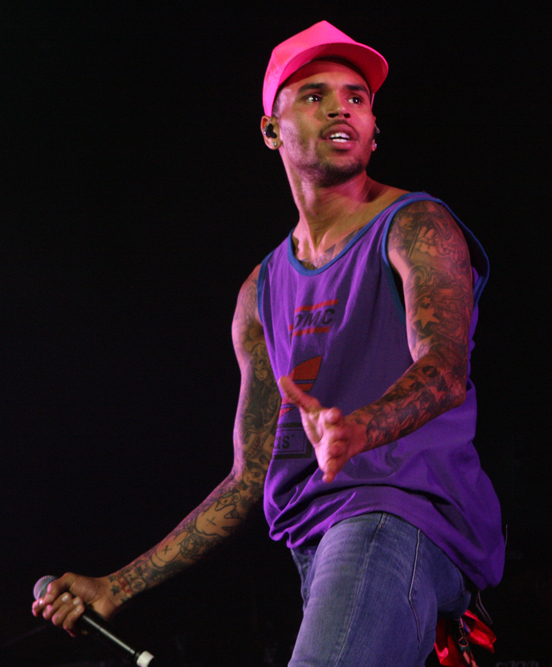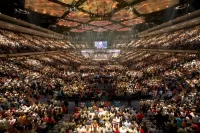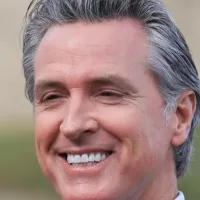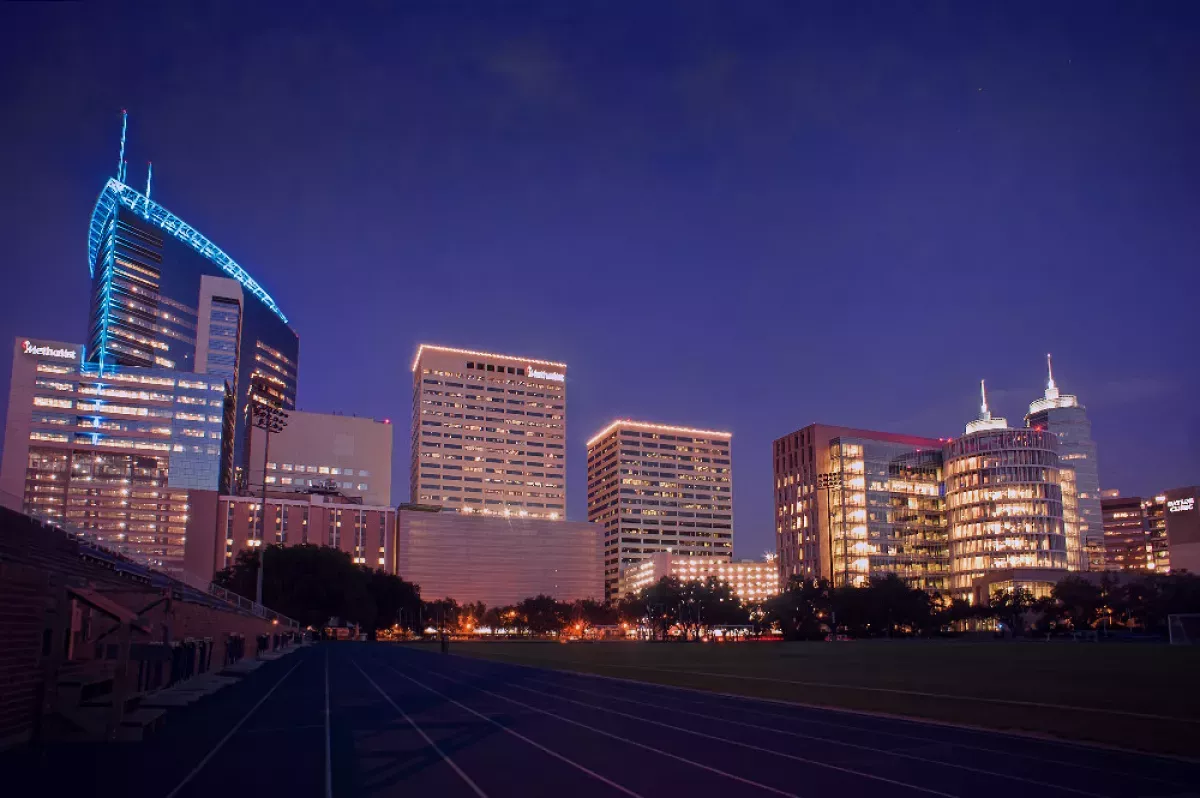Houston is the most populous city in Texas and the Southern United States. Situated in Southeast Texas near Galveston Bay and the Gulf of Mexico, it serves as the seat of Harris County and the principal city of the Greater Houston metropolitan area, which is the fifth-most populous in the U.S. With a population of over 2.3 million in 2023, Houston ranks as the fourth-most populous city in the United States and the sixth-most populous in North America. Houston is the southeast anchor of the Texas Triangle megaregion.
1900: Galveston Hurricane impact on Houston
Following the devastating hurricane in Galveston in 1900, efforts were accelerated to develop Houston into a viable deep-water port.
1900: Galveston Hurricane
In 1900, a devastating hurricane struck Galveston, which would later accelerate the development of Houston as a deep-water port.
1902: Houston Ship Channel Improvement Project Approved
In 1902, President Theodore Roosevelt approved a $1 million improvement project for the Houston Ship Channel.
1905: Abandonment of the Ward System
In 1905, the city of Houston abandoned the ward system in favor of a commission government.
1905: Restored Homes at Sam Houston Park
Sam Houston Park contains restored and reconstructed homes which were originally built between 1823 and 1905.
1910: Houston's Population Growth
By 1910, Houston's population nearly doubled from a decade before, reaching 78,800, with African Americans comprising nearly one-third of the residents, totaling 23,929 people.
1912: Rice University founded
In 1912, Rice University, a private, secular institution with a high level of research activity, was founded.
1914: Opening of the Port of Houston
In 1914, President Woodrow Wilson opened the deep-water Port of Houston, seven years after digging began.
1927: Texas Southern University founded
In 1927, Texas Southern University (TSU) was founded, becoming the first state university in Houston.
January 18, 1930: Coldest temperature recorded
On January 18, 1930, Houston's coldest temperature was officially recorded at 5 °F (−15 °C).
1930: Houston Becomes Texas's Most Populous City
By 1930, Houston had become the most populous city in Texas, and Harris County became the most populous county.
1940: Air Terminal Museum
Houston's aviation history is showcased in the 1940 Air Terminal Museum in the old terminal building on the west side of the Hobby Airport.
1940: Houston's Racial Demographics
In 1940, the U.S. Census Bureau reported Houston's population as 77.5% White and 22.4% Black.
1942: World War II Impact and Brown Shipbuilding Company Founding
In 1942, the Brown Shipbuilding Company was founded to construct ships for the U.S. Navy during World War II, contributing to Houston's economic growth and attracting a diverse workforce.
1945: Formation of the Texas Medical Center
In 1945, the M.D. Anderson Foundation formed the Texas Medical Center, laying the groundwork for Houston's future as a healthcare hub.
1947: University of St. Thomas founded
In 1947, the University of St. Thomas, Houston's only Catholic university, was founded.
1948: Houston Annexes Unincorporated Areas
In 1948, Houston annexed several unincorporated areas, more than doubling its size and initiating the city's regional expansion.
1948: Referendum on Land Use
In 1948, voters rejected efforts to establish separate residential and commercial land-use districts in Houston.
1950: Air Conditioning and Economic Shift
In 1950, the widespread availability of air conditioning encouraged companies to relocate to Houston, leading to an economic boom and a shift toward the energy sector.
1960: Road arterial network
Greater Houston's arterial road network is established at the municipal level, with the City of Houston exercising planning control over both its incorporated area and extraterritorial jurisdiction, with notable arterial roads in the region include Westheimer Road, Memorial Drive, SH 6, FM 1960, Bellaire Boulevard, and Telephone Road since 1960.
1960: Houston Christian University founded
In 1960, Houston Christian University (formerly Houston Baptist University) was founded.
1961: Establishment of NASA's Manned Spacecraft Center
In 1961, NASA's "Manned Spacecraft Center" was established in Houston, which would later be renamed the Lyndon B. Johnson Space Center in 1973, spurring the city's aerospace industry.
1962: Formation of the Houston Astros
In 1962, the Houston Astros, a Major League Baseball expansion team, were formed (known as the "Colt .45s" until 1965).
1962: Referendum on Land Use
In 1962, voters rejected efforts to establish separate residential and commercial land-use districts in Houston.
1965: Opening of the Astrodome
In 1965, the Astrodome, also known as the "Eighth Wonder of the World", opened as the world's first indoor domed sports stadium.
1965: NRG Astrodome Built
In 1965, the NRG Astrodome was built, becoming the first indoor stadium in the world.
1965: Immigration and Nationality Act
The Immigration and Nationality Act of 1965 removed quotas, allowing for the growth of other religions.
1967: Houston Nicknamed Space City
Houston received the official nickname of "Space City" in 1967 because it is the location of NASA's Lyndon B. Johnson Space Center.
1967: Airport Name Change
In 1967, Houston International Airport was renamed William P. Hobby Airport.
1969: Opening of Bush Intercontinental
In 1969, the opening of Bush Intercontinental Airport marked the end of international flights from Hobby Airport.
1970: Downtown Houston Boom
In 1970, Downtown Houston was on the threshold of an energy industry-led boom.
1970: Proportion of non-Hispanic whites
In 1970, non-Hispanic whites made up 62.4% of Houston's population.
1971: Houston Rockets Arrive in Houston
In 1971, the Houston Rockets, a National Basketball Association franchise, were based in the city.
October 5, 1972: First same-sex marriage in Texas
On October 5, 1972, the marriage of Billie Ert and Antonio Molina, considered the first same-sex marriage in Texas history, took place.
1973: Renaming of NASA Manned Spacecraft Center
In 1973, NASA's "Manned Spacecraft Center" was renamed the Lyndon B. Johnson Space Center.
1974: AMA Supercross Championship round at the Astrodome
In 1974, the Astrodome began hosting the AMA Supercross Championship round in motorcycling, a tradition that lasted until 2003 when it moved to the NRG Stadium.
1979: City council line-up based on U.S. Justice Department mandate
In 1979, the original city council line-up of 14 members (nine district-based and five at-large positions) was based on a U.S. Justice Department mandate which took effect.
1981: Rainfall average
Based on records between 1981 and 2010, Houston generally receives ample rainfall, averaging about 49.8 in (1,260 mm) annually.
1981: NBA Finals Hosted
Houston hosted the 1981 NBA Finals.
1981: Electricity spending for cooling
In 1981, annual spending on electricity for interior cooling in Houston exceeded $600 million, equivalent to $2.08 billion in 2024.
1982: Completion of JPMorgan Chase Tower
In 1982, the 75-floor, 1,002-foot-tall JPMorgan Chase Tower (formerly the Texas Commerce Tower) was completed, becoming Houston's tallest skyscraper.
1983: Completion of Wells Fargo Plaza
In 1983, the 71-floor, 992-foot-tall Wells Fargo Plaza (formerly Allied Bank Plaza) was completed, becoming the second-tallest building in Houston and Texas.
1985: LGBT influence in Montrose
By 1985, the flavor and politics of the Montrose neighborhood were heavily influenced by the LGBT community.
1986: MLB All-Star Game Hosted
Houston hosted the 1986 Major League Baseball All-Star Game and the NBA Finals.
December 23, 1989: Single digit temperatures
On December 23, 1989, Houston experienced single digit temperatures, with a low of 7 °F (−14 °C) recorded at Bush Airport, the coldest temperature ever recorded there. 1.7 inches of snow fell at George Bush Intercontinental Airport the previous day.
1990: Commuters driving alone to work
In 1990, 71.7% of commuters drove alone to work in Houston.
1991: Term limits spearheaded by Clymer Wright
In 1991, conservative political activist Clymer Wright spearheaded term limits for the city controller and city council members.
1991: Murder of Paul Broussard
Paul Broussard was murdered in Montrose in 1991.
1993: Referendum on Land Use
In 1993, voters rejected efforts to establish separate residential and commercial land-use districts in Houston.
1994: NBA Finals Hosted
Houston hosted the 1994 NBA Finals, winning the event.
1994: Houston Rockets Win NBA Championship
In 1994, the Houston Rockets won an NBA Championship.
1995: NBA Finals Hosted
Houston hosted the 1995 NBA Finals, winning the event.
1995: Houston Chronicle acquires Houston Post assets
In 1995, Hearst Communications, which owns and operates the Houston Chronicle, bought the assets of the Houston Post when it ceased operations.
1995: Houston Rockets Win NBA Championship
In 1995, the Houston Rockets won an NBA Championship.
1996: Houston Oilers leave the city
In 1996, the Houston Oilers left the city and were replaced by the Houston Texans in 2002.
1997: Election of Lee P. Brown
In 1997, Lee P. Brown was elected as Houston's first African American mayor.
1998: Relaxation of Mandatory Lot Sizes
In 1998, Houston relaxed its mandatory lot sizes from 5,000 square feet to 3,500 square feet, spurring housing construction in the city.
1999: Murdoch University study finds lengthy commute
A 1999 Murdoch University study found Houston had both the lengthiest commute and lowest urban density of 13 large American cities surveyed.
1999: Transco Tower renamed Williams Tower
In 1999, the Transco Tower was renamed Williams Tower. It is a 64-floor, 901-foot skyscraper designed by Philip Johnson and John Burgee.
September 4, 2000: Record high temperature
On September 4, 2000, Houston recorded a record high temperature of 109 °F (43 °C) at Bush Intercontinental Airport.
2000: Population increase
From 2000 to 2022, Houston's population increased by 15.7%.
2000: Lakewood Church Attendance Figures
In 2000, Lakewood Church in Houston had 11,000 weekly attendees.
2000: Opening of Daikin Park
In 2000, the Houston Astros opened their new baseball stadium, Daikin Park, in downtown Houston.
2000: Racial makeup of Houston
In 2000, the racial makeup of the city was 49.3% White, 25.3% black or African American, 5.3% Asian, 0.7% American Indian, 0.1% Pacific Islander, 16.5% from some other race, and 3.1% from two or more races. In addition, Hispanics and Latinos of any race made up 37.4% of Houston's population.
2000: Mosques and Religious Centers
In 2000, there were over 41 mosques and storefront religious centers in Houston, with the largest being the Al-Noor Mosque.
2000: Residential tower construction boom
Starting in 2000, a mini-boom of midrise and highrise residential tower construction occurred in Uptown Houston, with several towers over 30 stories tall. Since 2000 over 30 skyscrapers have been developed in Houston; all told, 72 high-rises tower over the city, which adds up to about 8,300 units.
June 2001: Tropical Storm Allison
In June 2001, Tropical Storm Allison caused severe flooding in Houston, resulting in billions of dollars in damage and 20 deaths in Texas.
2001: Tropical Storm Allison
In 2001, Houston experienced flooding from Tropical Storm Allison.
2001: Houston Jewish Community Size
In 2001, Houston's Jewish community was estimated at 47,000.
2001: Enron Scandal
In 2001, the Houston-based Enron Corporation, with $100 billion in revenue, became embroiled in an accounting scandal, leading to the company's bankruptcy in 2001.
2002: Uptown office space
In 2002, Uptown Houston had more than 23 million square feet of office space, with 16 million square feet classified as class A office space.
2002: Formation of the Houston Texans and Opening of NRG Stadium
In 2002, the Houston Texans were formed as an NFL expansion team, and NRG Stadium opened the same year.
2002: Formation of the Houston Texans
In 2002, the Houston Texans, a National Football League expansion team, were formed.
2003: Opening of the Toyota Center
In 2003, the Toyota Center opened as the home for the Houston Rockets.
2003: Voters Approved Five-Line System
In 2003, voters approved a five-line light rail system outlined in a referendum, of which two lines have yet to be constructed.
2003: AMA Supercross Championship round at NRG Stadium
Since 2003, the NRG Stadium has hosted the AMA Supercross Championship round in motorcycling, continuing the tradition that began in the Astrodome in 1974.
December 24, 2004: Snowstorm
On December 24, 2004, a storm brought 1 inch (3 cm) of snow to parts of the Houston metro area.
2004: METRO Red Line Opening
In 2004, METRO began light rail service with the opening of the 8-mile (13 km) north-south Red Line, which connected Downtown, Midtown, the Museum District, the Texas Medical Center, and NRG Park.
August 2005: Hurricane Katrina Evacuees
In August 2005, Houston sheltered over 150,000 evacuees from New Orleans due to Hurricane Katrina.
2005: Houston Area Survey indicates political division
According to the 2005 Houston Area Survey, there is a clear political division with the majority of non-Hispanic whites favoring Republicans, while the majority of non-Hispanic blacks and Hispanics favor Democrats.
2005: Lakewood Church Occupies Compaq Center
In 2005, Lakewood Church occupied the former Compaq Center sports stadium.
2005: Triumph Healthcare third largest long term acute care provider
In 2005, Triumph Healthcare hospital system was the third largest long term acute care provider nationally.
2005: Airport of the Year
In 2005, the Federal Aviation Administration and the state of Texas selected the Houston Airport System as "Airport of the Year" due to the implementation of a $3.1 billion airport improvement program.
2005: Houston Astros Appear in World Series
In 2005, the Houston Astros appeared in the World Series.
2005: Formation of the Houston Dynamo soccer team
In 2005, the Houston Dynamo soccer team was formed.
2006: Houston Dynamo Win MLS Cup
In 2006, the Houston Dynamo, a Major League Soccer franchise, won an MLS Cup title.
2006: Fastest Growing Airport
In 2006, the United States Department of Transportation named George Bush Intercontinental Airport the fastest-growing of the top ten airports in the United States.
2007: Texas Medical Center performs most heart surgeries worldwide
Around 2007, more heart surgeries were performed at the Texas Medical Center than anywhere else in the world.
2007: Office Space in Downtown
In 2007, Downtown Houston had over 43 million square feet of office space.
2007: Houston Dynamo Win MLS Cup
In 2007, the Houston Dynamo, a Major League Soccer franchise, won an MLS Cup title.
2007: Model Port of Entry
In early 2007, Bush Intercontinental Airport was named a model "port of entry" for international travelers by U.S. Customs and Border Protection.
December 10, 2008: Measurable snowfall
On December 10, 2008, Houston saw measurable snowfall of at least 1 inch (2.5 cm).
2008: Company Relocations
From 2008 to 2010, more than 100 foreign-owned companies relocated, expanded or started new businesses in Houston.
2008: Building Permits Issued
In 2008, Houston issued 42,697 building permits.
December 4, 2009: Measurable snowfall
On December 4, 2009, Houston experienced measurable snowfall of at least 1 inch (2.5 cm), marking the first time measurable snowfall had occurred in two consecutive years in the city's recorded history.
2009: Percentage of commuters driving alone to work
In 2009, 75.6% of commuters drove alone to work in Houston.
2009: Hobby Airport Awards
In 2009, Hobby Airport was recognized with two awards for being one of the top five performing airports globally and for customer service by Airports Council International.
2009: Houston elects first gay mayor
In 2009, Houston became the first U.S. city with a population over 1 million citizens to elect a gay mayor, Annise Parker.
2009: Election of openly lesbian mayor
In 2009, Houston elected the first openly lesbian mayor of a major city.
2009: Ranking in Healthiest Housing Markets
In 2009, Houston was ranked first in the list of healthiest housing markets.
2009: Foreign-Born Residents
Since 2009, nearly two-thirds of the Greater Houston area's foreign-born population are from south of the United States–Mexico border.
September 2010: Megachurches Listed in Outreach Magazine
In September 2010, Outreach magazine published a list of the 100 largest Christian churches in the United States, which included Houston-area churches such as Lakewood, Second Baptist Church Houston, Woodlands Church, Church Without Walls, and First Baptist Church.
2010: U.S. census population
At the 2010 United States census, Houston had a population of 2,100,263 residents.
2010: Rainfall average
Based on records between 1981 and 2010, Houston generally receives ample rainfall, averaging about 49.8 in (1,260 mm) annually.
2010: Company Relocations
From 2008 to 2010, more than 100 foreign-owned companies relocated, expanded or started new businesses in Houston.
2010: Continental Airlines Merger
In 2010, Houston-based Continental Airlines merged with United Airlines with headquarters in Chicago, after regulatory approval in October.
2010: Mining Contribution
In 2010, mining accounted for 26.3% of Houston's GAP, due to high energy prices and decreased worldwide surplus of oil production capacity.
2010: Population demographics
In 2010, whites (including Hispanic whites) made up 57.6% of Houston's population, while non-Hispanic whites constituted 24.6%. Blacks or African Americans made up 22.5% of the population, Asians 6.9%, and American Indians 0.3%.
2010: Houston's census count close to population benchmark.
The city of Houston's official 2010 census count was 600 shy of the required number (2.1 million residents) that would have automatically triggered the addition of two new city council districts.
August 2011: Two additional districts added to city council
In August 2011, two additional districts were added to the city council due to the city's population growth, with positions filled during elections.
August 27, 2011: Record high temperature
On August 27, 2011, Houston recorded a record high temperature of 109 °F (43 °C) at Bush Intercontinental Airport.
2011: Walk Score Ranking
A 2011 study by Walk Score ranked Houston the 23rd most walkable of the 50 largest cities in the United States.
2011: Orthodox Church Attendance in Texas
As of 2011, approximately 32,000 people actively attended Orthodox churches in the entire state of Texas.
2011: Harris Health System dental centers serve patients 16 and up
As of 2011, the dental centers of Harris Health System take patients of ages 16 and up with younger patients referred to the City of Houston's dental clinics.
2012: Ethnic diversity ranking
A 2012 Kinder Institute report found that Greater Houston was the most ethnically diverse metropolitan area in the United States.
2012: Houston Muslim Community Size
As of 2012, Houston had a large and diverse Muslim community, the largest in Texas and the Southern United States. It was estimated that Muslims made up 1.2% of Houston's population.
2012: Median length of commute estimated
In 2012, a commuting study estimated the median length of commute in the region was 12.2 miles (19.6 km).
2012: Merchandise Exports Recorded
In 2012, the Houston–The Woodlands–Sugar Land area recorded $110.3 billion in merchandise exports.
October 2013: Grand Prix of Houston held in NRG Park
In October 2013, the Grand Prix of Houston, an annual IndyCar Series auto race, was held on a 1.7-mile temporary street circuit in NRG Park using a tweaked version of the 2006–2007 course.
2013: Houston Top U.S. Market for Exports
According to data released by the U.S. Department of Commerce's International Trade Administration, in 2013, the Houston area became the top U.S. market for exports, surpassing New York City.
2013: Average work commute time recorded
According to the 2013 American Community Survey, the average work commute in Houston (city) takes 26.3 minutes.
2013: Freshman council member won a position
In 2013 a freshman council member won a position and can serve up to two additional terms under the previous term limit law.
2013: Estimate of Eastern Orthodox Christians in Houston
In 2013, Father John Whiteford estimated that there were about 6,000-9,000 Eastern Orthodox Christians in Houston.
2013: Houston Number One for Job Creation
In 2013, Houston was identified as the number one U.S. city for job creation by the U.S. Bureau of Statistics.
2013: Toyota Center's New Screen
In 2013, Toyota Center built the largest screen for an indoor arena in the United States to coincide with hosting the NBA All-Star Game.
2014: Age distribution
At the 2014-2018 census estimates, Houston's age distribution was 486,083 under 15; 147,710 aged 15 to 19; 603,586 aged 20 to 34; 726,877 aged 35 to 59; and 357,834 aged 60 and older.
2014: Christian Identification in Houston Area
In 2014, a Pew Research Center study found that 73% of the Houston area population identified as Christian, with about 50% Protestant and 19% Roman Catholic. Approximately 20% claimed no religious affiliation, and about 7% identified with other religions.
2014: Irreligious Community Statistics
In 2014, of Houston's irreligious community, 16% practiced nothing in particular, 3% were agnostic, and 2% were atheist.
2014: Houston Bcycle Expansion
In 2014, the Houston Bcycle network expanded to 29 stations and 225 bicycles, registering over 43,000 checkouts of equipment during the first half of the year.
May 2015: Memorial Day Flood
In May 2015, seven people died after 12 inches of rain fell in 10 hours during what is known as the Memorial Day Flood.
2015: Referendum results in four-year mayoral term
As a result of a 2015 referendum in Houston, a mayor is elected for a four-year term and can be elected to as many as two consecutive terms.
2015: Median gross rent
Houston's median gross rent from 2015 to 2019 was $1,041.
2015: Households lacking a car in Houston
In 2015, 8.3 percent of Houston households lacked a car.
2015: Downtown Houston Cycle Track
In 2015, Downtown Houston added a cycle track on Lamar Street, running from Sam Houston Park to Discovery Green.
2015: Memorial Day flood
In 2015, Greater Houston experienced a major flood event known as the "Memorial Day" flood.
2015: Houston's Skyline Ranking
In 2015, Houston had the fifth-tallest skyline in North America and 36th-tallest in the world.
2015: International Flights Launched
In 2015, Southwest Airlines launched service from a new international terminal at Hobby to several destinations in Mexico, Central America, and the Caribbean.
2015: Houston Population Distribution in 2015
In 2015, approximately 470,000 people lived within the Interstate 610 loop in Houston, while 1.65 million lived between Interstate 610 and Beltway 8, and 2.25 million lived within Harris County outside Beltway 8.
January 2016: Chris Brown's first term as city controller
As of January 2016, Chris Brown began serving his first term as the city controller, who is elected independently and certifies available funds.
April 2016: April 2016 Storm
In April 2016, eight people died during a storm that dropped 17 inches of rain in Houston.
2016: Jewish Population Increase
According to a study in 2016 by Berman Jewish DataBank, 51,000 Jews lived in the Houston area, which is an increase of 4,000 since 2001.
2016: Muslim Diversity in Houston
As of 2016, Muslims in the Houston area included South Asians, Middle Easterners, Africans, Turks, Indonesians, and a growing population of Latino Muslim converts.
2016: METRO ridership numbers for fiscal year
During the 2016 fiscal year, METRO's local bus network saw nearly 67 million boardings.
2016: End of mayoral tenure
Houston's first openly lesbian mayor served until 2016.
2016: Households lacking a car in Houston
In 2016, 8.1 percent of Houston households lacked a car.
2016: Houston Airport System Passenger Count
In 2016, George Bush Intercontinental Airport and William P. Hobby Airport served 55 million passengers.
2016: George Bush Intercontinental Airport Passenger Count
In 2016, George Bush Intercontinental Airport served 40 million passengers, including 10 million international travelers.
2016: Tax Day flood
In 2016, Greater Houston experienced a major flood event known as the "Tax Day" flood.
2016: Majority of commuters drive alone to work
In 2016, an estimated 77.2% of commuters drove alone to work in Houston, up from 71.7% in 1990.
2016: Varying LGBT acceptance and discrimination
In 2016, levels of LGBT acceptance and discrimination varied in Houston due to some of the region's traditionally conservative culture.
2016: Light Rail Boardings
In fiscal year 2016, the light rail system saw approximately 16.8 million boardings.
March 2017: Houston Bike Plan Approved
In March 2017, the Houston City Council approved the Houston Bike Plan, entering the plan into the Houston Code of Ordinances.
August 2017: Additional Bike Trails Approved
In August 2017, the Houston City Council approved spending for the construction of 13 additional miles of bike trails.
August 2017: Hurricane Harvey
In late August 2017, Hurricane Harvey caused severe flooding in Houston, with some areas receiving over 50 inches of rain, leading to an estimated $125 billion in damage and over 70 deaths.
November 2, 2017: Houston Press switches to online-only format
On November 2, 2017, the Houston Press switched to an online-only format after the destruction caused by Hurricane Harvey.
December 7, 2017: Snowfall event
On December 7, 2017, Houston experienced a snowfall event that precipitated 0.7 inches (2 cm) of snowfall.
2017: Preference for walkability among Houstonians
A 2017 study by the Rice University Kinder Institute for Urban Research found 56% of Harris County residents have a preference for dense housing in a mixed-use, walkable setting.
2017: Council members serving eight years in office
As of 2017 some council members who served two terms and won a final term will have served eight years in office due to term limit changes.
2017: World Series Hosted
Houston hosted the 2017 World Series, and the city won its first baseball championship.
2017: Bcycle Check Outs
In 2017, Bcycle logged over 142,000 check outs while expanding to 56 docking stations.
2017: Hurricane Harvey
In 2017, Greater Houston experienced a major flood event during Hurricane Harvey.
2017: United Airlines Market Share
In 2017, United Airlines' share of the Houston Airport System's commercial aviation market was nearly 60% with 16 million enplaned passengers.
2017: Ozone pollution ranking
In 2017, the American Lung Association rated the Houston metropolitan area's ozone level twelfth on the "Most Polluted Cities by Ozone".
2017: Estimated population
In 2017, the census-estimated population of Houston was 2,312,717. An estimated 600,000 undocumented immigrants resided in the Houston area in 2017, comprising nearly 9% of the city's metropolitan population.
2017: End of Grand Prix of Houston contract with IndyCar
The Grand Prix of Houston had a five-year race contract through 2017 with IndyCar, marking the end of the agreement.
2018: Grand Parkway construction update
As of 2018, eight of eleven segments of the 180-mile (290 km) SH 99 (the Grand Parkway) loop were completed.
2018: Age distribution
At the 2014-2018 census estimates, Houston's age distribution was 486,083 under 15; 147,710 aged 15 to 19; 603,586 aged 20 to 34; 726,877 aged 35 to 59; and 357,834 aged 60 and older.
2018: Racial demographics
In 2018, non-Hispanic whites made up 20.7% of the population of Houston, Hispanics or Latino Americans 44.9%, blacks or African Americans 30.3%, and Asian Americans 8.2%.
2018: Floodplain development rules passed
In 2018, the Houston City Council passed a regulation requiring developers to build homes two feet above the 500-year floodplain, with a vote of 9-7.
2018: Estimated population
In 2018, the census-estimated population of Houston was 2,325,502.
2018: Overall snowfall
Overall, Houston has seen measurable snowfall 38 times between 1895 and 2018.
2019: Tropical Storm Imelda
In 2019, Houston experienced flooding from Tropical Storm Imelda.
2019: Housing statistics
In 2019, Houston had 987,158 housing units and 876,504 households. An estimated 42.3% of Houstonians owned housing units, with an average of 2.65 people per household. The median household income in 2019 was $52,338 and 20.1% of Houstonians lived at or below the poverty line.
2019: Racial demographics
In 2019, according to the U.S. Census Bureau, non-Hispanic whites made up 23.3% of the population of Houston proper, Hispanics and Latino Americans 45.8%, blacks or African Americans 22.4%, and Asian Americans 6.5%.
2019: Houston Astros Appear in World Series
In 2019, the Houston Astros appeared in the World Series.
2019: Catholic Archdiocese Claims
In 2019, the Roman Catholic Archdiocese of Galveston-Houston claimed approximately 1.7 million Catholics within its boundaries.
2019: Murder rate in Houston before significant jump
In 2019, the murder count in Houston was significantly lower compared to 2021, before the murder rate jumped significantly in 2020.
2019: Age distribution
Per the 2019 American Community Survey, Houston's age distribution was 482,402 under 15; 144,196 aged 15 to 19; 594,477 aged 20 to 34; 591,561 aged 35 to 54; 402,804 aged 55 to 74; and 101,357 aged 75 and older. The median age of the city was 33.4.
2020: Houston's murder rate jumped significantly
Houston's murder rate jumped significantly in 2020.
2020: Tropical Storm Beta
In 2020, Houston experienced flooding from Tropical Storm Beta.
2020: Eastern and Oriental Orthodox Houstonians
In 2020, the Association of Religion Data Archives numbered 16,526 Eastern and Oriental Orthodox Houstonians.
2020: Houston Dash Win First Title
In 2020, the Houston Dash team playing in the National Women's Soccer League won their first title.
2020: Religious Demographics in Houston
In 2020, the Public Religion Research Institute estimated that 40% of Houston's population was Protestant and 29% was Catholic, with Christianity representing 72% overall. Additionally, the Association of Religion Data Archives determined that the Catholic Church numbered 1,299,901 in the metropolitan area, while Southern Baptists numbered 800,688.
2020: U.S. census population
The 2020 U.S. census determined Houston had a population of 2,304,580.
2021: Nearly 500 murders in Houston
In 2021, nearly 500 people were murdered in the city which was almost double the murdered count in 2019, with rising gang activity blamed for the increased crime rates.
2021: Houston Astros Appear in World Series
In 2021, the Houston Astros appeared in the World Series.
April 4, 2022: Hewlett Packard Enterprise Relocates
On April 4, 2022, Hewlett Packard Enterprise relocated its global headquarters from California to the Greater Houston area.
2022: Population increase
From 2000 to 2022, Houston's population increased by 15.7%.
2022: Hobby Airport Certified as 5-Star Airport
In 2022, Hobby Airport was certified as the first 5-Star Airport in North America by Skytrax, becoming the 16th airport worldwide to receive this accomplishment.
2022: Metro Area GDP
In 2022, the Houston–The Woodlands–Sugar Land metro area's gross domestic product (GDP) was $633 billion, making it the seventh-largest of any metropolitan area in the United States.
August 27, 2023: Record high temperature
On August 27, 2023, Houston recorded a record high temperature of 109 °F (43 °C) at Bush Intercontinental Airport.
2023: Houston Population in 2023
In 2023, Houston had a population of 2,314,157, making it the fourth-most populous city in the United States.
2023: Enforcement of anti-food sharing ordinance and lawsuit
In 2023, the city of Houston made enforcement of an anti-food sharing ordinance a priority, resulting in volunteers receiving over 80 tickets and a federal lawsuit being filed against the city.
May 16, 2024: Derecho Damage
On May 16, 2024, a strong derecho caused widespread damage across the city of Houston and its surrounding metropolitan area.
June 2024: Bicycle Sharing System Ended
Houston's bicycle sharing system, Houston Bcycle, ended in June 2024. It was a local non-profit that ran the subscription program, supplying bicycles and docking stations, partnering with other companies to maintain the system.
2024: Electricity spending for cooling
In 1981, annual spending on electricity for interior cooling in Houston was equivalent to $2.08 billion in 2024.
2024: Houston Roughnecks Move to UFL
In 2024, the Houston Roughnecks are set to start operations in the UFL, after moving from the XFL.
Mentioned in this timeline

Chris Brown is a highly successful American singer songwriter rapper...

Wells Fargo Company is a multinational financial services institution operating...
California is a U S state on the Pacific Coast...

JPMorgan Chase Co incorporated in Delaware and headquartered in New...

Lakewood Church a non-denominational evangelical Christian megachurch in Houston Texas...
Colombia officially the Republic of Colombia is a country located...
Trending

19 minutes ago Dewald Brevis Hits Remarkable No-Look Six in T20 World Cup 2026

19 minutes ago Alejandro Tabilo reaches Rio Open Semi-Finals; match delayed to Sunday due to rain.
20 minutes ago Cale Makar's Norris Trophy Reign Challenged by American Defenders in NHL Rankings.
20 minutes ago Mark Scheifele Visits Penticton Vees, Hellebuyck Focuses on Olympics Despite NHL Woes

20 minutes ago Newsom supports age restrictions on social media citing parental experience and teen phone obsession.

21 minutes ago US pays tribute to Johnny and Matthew Gaudreau at the Winter Olympics.
Popular

Jesse Jackson is an American civil rights activist politician and...

Barack Obama the th U S President - was the...

Bernie Sanders is a prominent American politician currently serving as...

Ken Paxton is an American politician and lawyer serving as...

Michael Joseph Jackson the King of Pop was a highly...
WWE Raw a professional wrestling television program by WWE airs...
